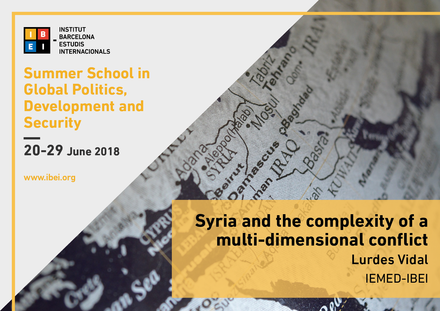Syria and the complexity of a multi-dimensional conflict
6 hour course
June 25 – 26 (3.00 – 6.00 pm)
The Syria revolution erupted in 2011 following the so-called Arab Spring uprisings in neighboring countries. The initial peaceful revolutionary movement was harshly repressed from the beginning and quickly suffered a militarisation process that ended up in a long and highly lethal war. The Syrian conflict has witnessed over the last 7 years a growing trend of sectarianism and the emergence of radical militias in both sides and Jihadi-inspired groups such as ISIS. They have further complicated the conflict and operated thanks to and favoring foreign intervention.
Syria is a local conflict that has gradually absorbed regional tensions (both historical and recently-created) and global rivalries playing simultaneously on the Syrian ground. Therefore, its effects will have implications not only for Syrians and Middle-Easters, but also for the international community as a whole.
In this course we will study drivers, origins, actors - domestic and external - and consequences of a conflict that has been considered the biggest humanitarian tragedy since the II World War.
Session 1. Internal dynamics of the Syrian conflict
Syria: the challenges of demography and geography. The features of Syrian authoritarianism: Assadism and Baassism. Motivations and drivers of the Syrian uprising. Domestic actors of the opposition in the Syrian conflict: from grassroots opposition to exiled representatives. The structure of Syrian repression and the evolution towards the militarization of the revolt. Who is who in the fight?
Session 2. Regional and international dynamics of the Syrian conflict and the future of jihadi and militant salafi groups in the region
Syria as a multi-dimensional conflict. The crisis of the post-colonial Arab state model. Sectarianism, factionalisation and conflict. Regional alliances and rivalries at play in the Syrian context. Global actors and their role in Syria. The failure of diplomacy and mediation in the Syrian war. Consequences of Syria: migration, refugees, displacement and the human toll. Global derivations of the Syrian war: the humanitarian paradigm at stake. The drivers and context of ISIS emergence in Syria and Iraq. Features of militant salafi groups and their role in the Syrian conflict. What is the future of ISIS in the region? Exploring the prospects of ISIS survival in post-2018 Syria and its global and regional ramifications.

